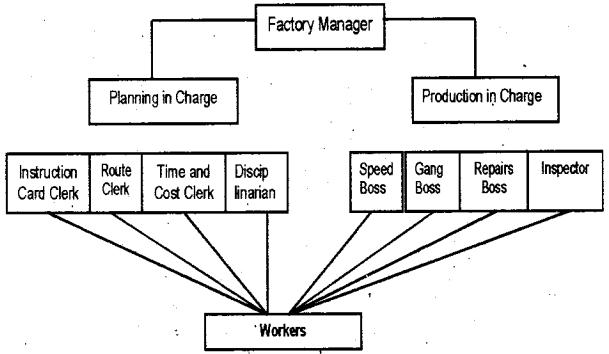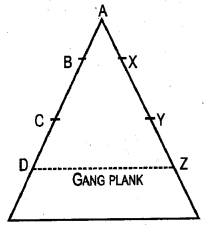Kerala Plus Two Business Studies Notes Chapter 2 Principles of Management
Nature of Principles of Management
Principles of management are statements of fundamental truth which provides guidelines for management decision making and action. The nature of management principles are:
- Universal applicability: Management principles ha/e universal application in all types of organizations.
- General guidelines: The principles are guidelines to action.
- Formed by practice and experimentation: The principles of management are formed by experience and experimentation of managers.
- Flexible: The principles of management are not rigid. They are flexible and can be modified according to the situation.
- Influencing human behaviour: Management principles aim at influencing behaviour of human beings.
- Cause and effect relationship: The principles of management establish the relation between the cause and effect.
Significance of the Principles of Management
1) Increase efficiency: The understanding of the management principles provides guidelines to the managers for handling effectively the complex problems.
2) Optimum utilization of resources: The principles of management helps in the optimum utilization of resources through division of work, delegation of authority, etc.
3) Scientific decision: Management principles help in thoughtful decision-making. Such decisions are free from bias and prejudices.
4) Meeting the changing environmental requirements: Management principles are flexible and can be modified to meet changing requirements of environment.
5) Fulfilling social responsibility: Management principles help the managers to fulfill the social responsibilities towards the society.
Taylor’s Scientific Management
Fredrick Winslow Taylor (1856-1915) is known as the Father of Scientific Management. His book ‘Principles of Scientific Management’was published in 1911.
In the words of Taylor, “Scientific management means knowing exactly what you want men to do and seeing that they do it in the best and cheapest way”.
Principles of Scientific Management
1) Science and not the rule of thumb: The first principle of scientific management requires scientific study and analysis of each element of job in order to replace old rule of thumb approach.
2) Harmony, not discord: As per this principle, there should be complete harmony between the management and workers. Taylor called for complete mental revolution on the part of both management and workers. Both the parties should realize each other’s importance and work towards the profits of the firm.
3) Co-operation not individualism: There should be complete co-operation between the labour and the management instead of individualism. According to Taylor, there should be an almost equal division of work and responsibility between workers and management.
4) Development of each and every person to his or her greatest efficiency and prosperity: The growth and development of an organisation depends on the efficiency and prosperity of employees. The efficiency of employees can be developed by giving proper training and development. This ensure the growth of an organisation.
Techniques of Scientific Management
1) Functional foremanship: Functional foremanship is a technique in which planning and execution are separated. He classified 8 specialist foremen into two departments viz. Planning and Production department. Both departments have four foremen each. Functional foremanship is based on the principle of division of work.
Planning Department:
- Route Clerk
- Instruction Card Clerk
- Time and Cost Clerk
- Shop Disciplinarian
Production Department:
- Gang Boss
- Speed Boss
- Repair Boss
- Inspector

a) Route clerk: To lay down the sequence of operations through which the raw materials have to pass in the production process.
b) Time & cost clerk: To lay down the standard time for completion of the work.
c) Instruction card clerk: He is expected to deal the instructions to be followed by workers in handling the job.
d) Disciplinarian: He maintains proper discipline in the factory.
e) Gang boss: He arranges material, machine, tool, etc. for operation.
f) Speed boss: He supervises matters relating to the speed of work.
g) Repair boss: He ensures repairs and maintenance of the tools and machines.
h) Inspector: He checksthe quality of work done.
2) Standardisation and simplification of work: Standardisation refers to the process of setting standards for every business activity. It includes use of standard tools and equipments, methods, working conditions, etc., for the maximization of output. Simplification aims at eliminating unnecessary diversity of products. It results in savings of cost of labour, machines and tools.
3) Method study: The objective of method study is to find out one best way of doing the job. The main objective is to minimize the cost of production and maximize the quality of the work.
4) Motion study: Motion study involves close observation of the movements of the workers and machines to perform a particular job. It helps to eliminate unnecessary movements of men, materials and machine.
5) Time study: It determines the standard time taken to perform a well-defined job. The objective of time study is to determine the number of workers to be employed, frame suitable incentive schemes and determine labour costs.
6) Fatigue study: Fatigue study seeks to determine the amount and frequency of rest intervals in completing a task.
7) Differential piece wage system: Under this system of wage payment, two kinds of rates are laid down.
- Higher rates are offered to those workers who produce more than standard output.
- Lower rates for those who produce below standard output.
8) Mental revolution: It involves a change in the mental attitude of workers and management towards each other. Both the parties should realise each other’s importance and work towards the profit of the firm.
Fayol’s Principles of Management
Henry Fayol (1841-1925) is known as the ‘Father of General Management’. The 14 principles of management given by him are:
1) Division of Work: This principle states that a complex work should be divided into small tasks, and each task should be assigned a particular employee. Division of work leads to specialization.
2) Authority and Responsibility: Authority is the right to give orders to the subordinates and responsibility is the obligation to perform the work in the manner directed by authority. There should be a balance between authority and responsibility.
3) Discipline: it is the obedience to organizational rules and employment agreement which are necessary for working of the organization.
4) Unity of Command: The principle of unity of command states that each employee should receive orders from one superior only. It helps to avoid confusion and conflict in the employees.
5) Unity of Direction: Each group of activities having the same objective must have one head and one plan. This ensures unity of action and co-ordination.
6) Subordination of Individual Interest to General Interest: The Interest of an organization should take priority over the interests of anyone individual employee.
7) Remuneration of Employees: Remuneration should be just, equitable and fair to both employees and the organization.
8) Centralization and Decentralization: Centralisation means concentration of authority at the top management. Decentralization means dispersal of authority to the lower levels in the organisation. There should be a balance between Centralisation and decentralization.
9) Scalar Chain: The formal lines of authority from highest to lowest ranks are known as scalar chain. According to this principle, communication should pass through the established chain of command. It ensures unity of command and effective communication.
Gang Plank : According to the concept of gang plank persons of the same rank can communicate with each other especially in emergency situations. It helps to save a lot of time in communication and possibility of distortion of messages can be reduced.

10. Order: According to Fayol, “People and materials must be in suitable places at appropriate time for maximum efficiency.”
11. Equity: This principle requires the managers to be kind and just to workers. Superiors should be impartial while dealing with their subordinates.
12.Stability of Personnel: According to Fayol, workers should not be moved from one job to another frequently. It helps to minimise labour turnover in the organization.
13.Initiative: Workers should be encouraged to develop and carry out their plans for improvements.
14. Espirit De Corps (Union is strength): According to Fayol, Management should promote a team spirit of unity and harmony among employees.
Fayol VS. Taylor – A Comparison
| Henri Fayol | F.W. Taylor |
| 1. Father of General Management | 1. Father of Scientific Management |
| 2. Focuses on top level management | 2. Focuses on shop floor level of a factory |
| 3. Unity of command – A worker received orders from one superior only | 3. Functional foremanship- A worker received orders from eight specialists. |
| 4. Applicable universally | 4. Applicable to specialised situations |
| 5. Formulated principles from personal experience | 5. Formulated principles from Observations and Experimentation |
| 6. It focuses on improving overall administration | 6. It focuses on increasing productivity |
Plus Two Business Studies Notes
